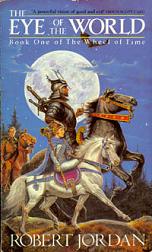
The Eye of the World
Robert Jordan
800 pages
published in 1990
By that time however I must've read The Eye of the World at least a dozen times, rereading the complete cycle every time a new book in the series came out. Especially when I was still supposedly a student, there was many a day when I woke up determined to do some work that day, only to grab The Eye of the World and finish it when it had gotten dark again.
But that was a decade ago. This was the first time I've reread The Eye of the World since I've abandonded the series. The reason for this, as you'll probably have guessed if you are a fan, is sad: Robert Jordan died recently, after a long illness, and the obituaries reminded me of how much I liked The Wheel of Time back then. The question was, would I still like the series now?
So far, the answer is yes. Once I got some time to really get my teeth in it, the pages flew past. On the sentence and paragraph and even on the plot level I could tell Robert Jordan was not that good a writer: lots of repeating stock phrases, awkward descriptions, somewhat cliched characters, especially in the beginning, as well as a plot that is ripped off from The Fellowship of the Ring. What Jordan does well however is telling a story and making you want to finish the story.
The story starts with Rand Al'Thor and his father bringing supplies from their farm to Emond's Field for Bel Tine; it may still look more like winter than spring but that will not stop the Two Rivers people from having a well deserved feast. Halfway through the journey Rand notices somebody watching him, a rider clad all in black on a black horse, wearing a cloak that doesn't move in the wind... Once in the village, it seems Rand's not the only one being watched: his best friends Mat and Perrin have also seen him. Yet the three friends have little time to worry, as there's the lady Moiraine showing an interest in them -- and an actual lady is not a common sight in the Two Rivers. Things come to a head on the eve of Bel Tine, when Rand and Tam have gone back to their farm, almost gone to bed and almost forgotten about the stranger in black, when the farm is attacked, by creatures out of legend -- Trollocs, half beast, half men creatures of the Dark One...
Emond's Field is attacked as well, and Moiraine is revealed for whom she really is: an Aes Sedai, one of the half legendary women who can wield the One Power, women feared as much as admired, even if they stand between the world and the Dark One. Aes Sedai are manipulators, devious schemers, but Rand, Mat and Perrin have no choice but to put their trust in Moiraine, or see their village attacked again. They have to leave the Two Rivers and come to Tar Valon, home of the Aes Sedai to be safe. But of course things are not as simple as that, as the three are not the only ones leaving with Moiraine...
As said, the bare outline of the plot, especially in the first half of the book, does bear an uncanny resemblance to that of The Fellowship of the Ring. There's the cozy start in the sheltered rustic village, the flight from the shadowy dark riders out of the familiar homeland to Bree/Baerlon, the dawning realisation that the adventure will be much longer and dangerous than first assumed, undsoweiter. Gradually however Jordan builds on these bare outlines, introduces elements not found in Tolkien and in the end creates his own story. He is clearly inspire by and has cribbed from Tolkien, but he uses it as the foundation for his own world.
In the end The Eye of the World will never be the best fantasy novel ever written, and you can certainly live happily without ever having read the series. However, at the same time it did not become a bestseller for nothing. Quite a few people fell in love with the series and followed it despite all the annoyances, despite the endless spinning out of the story, despite the at times overwhelming frustration about why thse bloody people can never just talk to each other. The simple fact is that Jordan could tell a story and keep you interested and that was enough for me.
Read more about:
Robert Jordan,
The Eye of the World,
fantasy,
book review